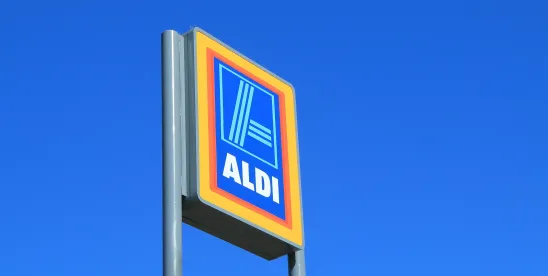The Aldi supermarket chain has built a loyal and growing following—Aldi is on pace to open more than 225 new stores this year and promotes itself as a lower-cost alternative to traditional brands. Aldi’s slogan is “like brands, only cheaper.” Under this business model, and similar to many other large retailers, Aldi promotes its private-label branded products. But food giant Mondelez International Brands is now alleging that Aldi has taken their slogan too far when it comes to product packaging of some of Mondelez’s brands.
Mondelez is challenging Aldi’s packaging design strategy, filing a lawsuit in the U.S. District Court for the Northern District of Illinois alleging Aldi’s store brand packaging designs are too “like brands” Oreo, Wheat Thins, Nutter Butter, Chips Ahoy, Ritz, Premium, and Nilla Wafters, all owned by Mondelez. The suit was filed May 27, 2025, and accuses Aldi of willful trade dress infringement and unfair competition.
The goal of trademark and trade dress protection is twofold: (1) to protect consumers from being misled or confused about the origin of the product so consumers can reasonably identify and select products based on the brand expecting a certain quality and reputation; and (2) to safeguard the goodwill and reputation a business has built around a brand, ensuring that others do not unfairly profit from or dilute that investment. For instance, if a customer picks up a package of Oreo cookies, based on the goodwill that Mondelez has built up the Oreo brand, that customer reasonably knows what to expect in terms of quality.
At the heart of this case is what Mondelez claims to be the systemic copying by Aldi of the visual design of at least seven of its most recognizable brands. These identical types of products (i.e., cookies and crackers) are alleged to have packaging designs with similar colors, fonts, layouts, and imagery as the Mondelez brands.

For example, Aldi’s Original Sandwich Cookies with Vanilla Filling are packaged in a blue and white bag, with the cookies in the center and a red logo in the upper left corner. The layout, design, and color scheme resemble the Oreo packaging design. But the question for the court is, “Does this similarity constitute trade dress infringement?”
Mondelez argues that it does, calling Aldi’s packaging in question “blatant copies” that are “likely to deceive and confuse” customers. Mondelez is seeking monetary damages and injunctive relief.
Last year, Aldi lost a similar lawsuit in Australia. An Australian court ruled that its packaging infringed the copyrights of Hampden Holdings’ Baby Bellies, a children’s snack brand.

While it is common for private-label brands to share some general features with their national brand equivalent products, signaling to consumers that this is a lower-cost alternative, this case could have broad implications on how closely the private-label brands can resemble national brands without violating trademark and trade dress infringement.
Will more major brands be increasingly willing to litigate to protect the look and feel of their products, and not just their names as retailers like Aldi grow their private-label offering and increasingly complete directly with national brands? This case underscores what appears to be a growing tension between national brand owners and retailers over how far private labels can go in mimicking established protects.
Companies should ensure their products designs are distinctive and legally defensible, balancing cost-effective branding and clever marketing with legal compliance to avoid infringement claims. Like for trademarks, clearance research and analysis should be done for trade dress, including packaging designs, prior to use.
The case is Mondelez International, Inc. et al. v. Aldi Inc.





 />i
/>i

